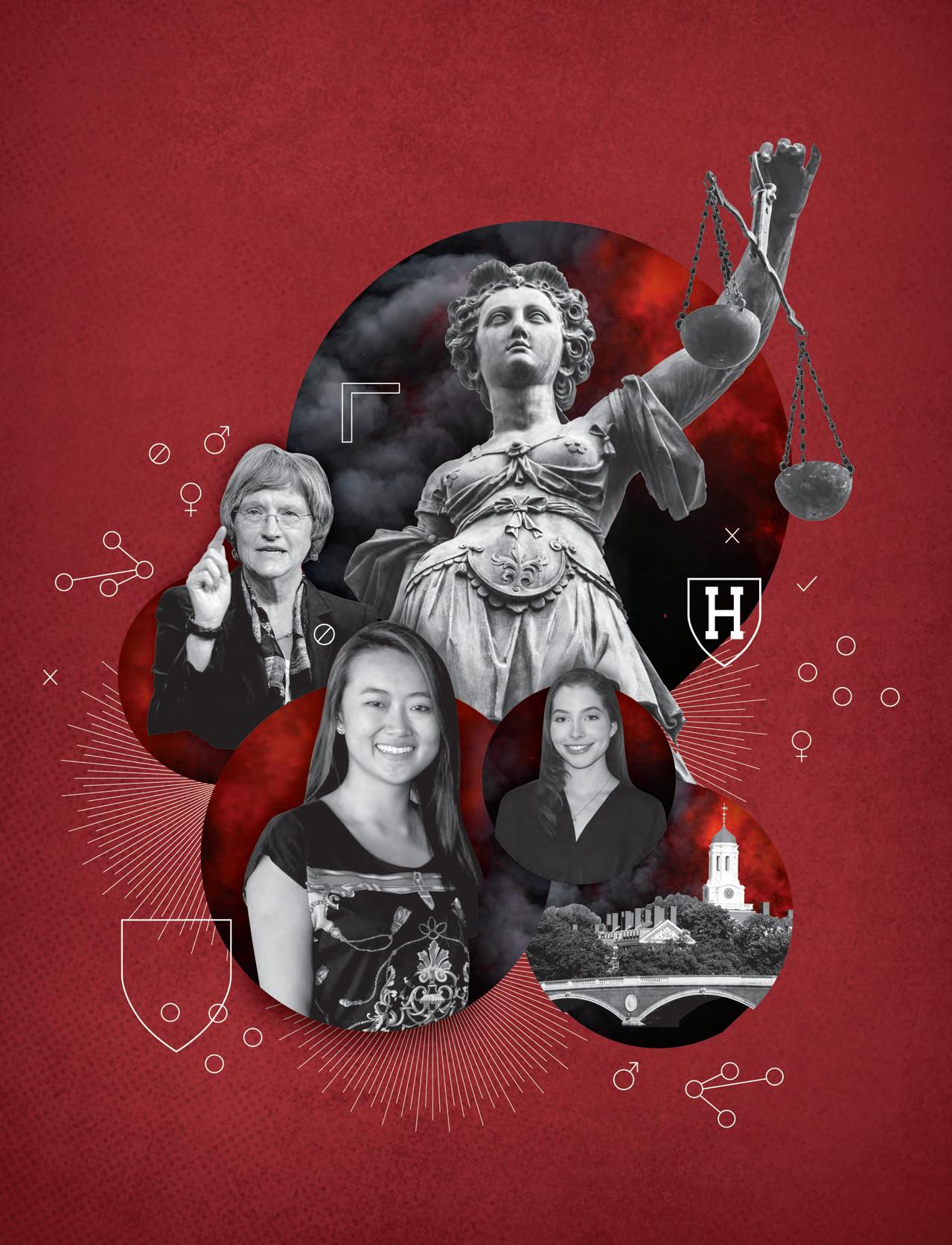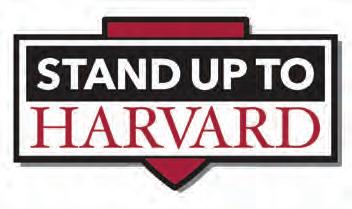
14 minute read
STANDING UP TO HARVARD
by Gina Henke
The world watched as Harvard shared news in 2016 that it would strip their single-gender organizations of equal rights and representation. As of the print deadline, Alpha Phi’s Iota Tau chapter was the only remaining women’s group on campus because of the college administration mandate that single-gender organizations and final clubs could no longer receive equal opportunities on campus. As of just June 29 — a victorious date for Alpha Phi and other Greek organizations — Alpha Phis and others will have the freedom to gather without fear. On that date, current President of Harvard Lawrence S. Bacow released an email statement to the Harvard community, rescinding the policies that prevented single gender social groups from receiving the same rights as others on campus.
Advertisement
A cause for celebration, the repeal of the ruling has been recent — although so many of us have long recognized the need for the discriminatory sanctions to be lifted. Our sisters and brothers in the Greek system have also dedicated their valued voices to this issue, and we have fought for years to allow members to gather in support of one another.
The message from Harvard is discussed in detail in the sidebar on page 22. There, you will also read what current Alpha Phi chapter President Hannah Printz (Iota Tau-Harvard) has to say about the importance of this turnabout.
This article was written before Harvard removed their policy, and we believe it is important to recognize the women who took a stand for what they believe in. In the world in which we live, we are reminded how critical it is to learn, grow, act and listen to support the rights of all of our members. The former Harvard policy left women without a true opportunity to engage in organizations that are important to them, for fear of repercussions.
Standing up for what you believe in is important. Our founders knew it. Our volunteers and staff know it. Our collegians know it. Our alumnae know it. Amelia, Michelle and the women of Iota Tau know it. It is time for us all to
— AMELIA APGAR (IOTA TAU-HARVARD)
be inspired to reflection, to action, to further education and to continuing conversations that challenge us to always do what is right.
The journey taken by the women of Iota Tau is one of courage, loyalty, determination and belief. While several men’s-only organizations were allowed to operate without the same fear of the sanctions — because they owned their own property and enjoyed the financial security that comes from having hundreds of years of alumni — two Alpha Phis led the fight for what they believe in — equality, sisterhood, empowerment, one another and our Fraternity.
Meet the women who led the fight to reestablish the Iota Tau chapter on Harvard’s campus.
BY GINA HENKE
FAUST
XIE
POHOTO CREDITS: DREW G. FAUST (PHOTO BY MICHAEL WUERTENBERG/ WORLD ECONOMIC FORUM); JUSTICE (QUERBEET/ISTOCK); HARVARD (JORGEANTONIO/ISTOCK) APGAR
When Amelia Apgar (Iota Tau-Harvard) and Michelle Xie (Iota Tau-Harvard) joined Alpha Phi, they were intrigued by the community aspect of the organization.
“As a first-generation college student, I struggled to become acclimated to collegiate life during my first semester. Joining such a close-knit community on campus was truly a turning point in my undergraduate career: I met so many new friends, like-minded women passionate about empowering one another and mentors,” reflected Amelia, now a graduating senior.
She never anticipated she would have the opportunity to attend college, let alone an institution like Harvard. It was through becoming an Alpha Phi that Amelia began to feel comfortable navigating the intense, new environment. “…I truly do not believe my college experience would have been possible, let alone memorable, without Alpha Phi,” said Amelia.
Michelle, an alumna since 2019, also struggled with belonging when she stepped onto Harvard’s campus. “Looking back, I think many students have ‘imposter syndrome’ for being a Harvard student,” recalled Michelle. “I joined Alpha Phi because I loved the idea of being able to turn to a diverse group of women on campus for any question I had. I also loved that Alpha Phi and Greek life, in general, is not confined to just one campus…I was joining an international sisterhood and network of strong women.”
Michelle and Amelia served as Iota Tau presidents at different stages in the fight for women’s groups’ rights at Harvard (Michelle first and then Amelia), and advocating for the preservation of those rights connected them on a who new level.
In 2016, Harvard’s then President, Drew G. Faust, decreed that “undergraduate members of unrecognized single-gender social organizations will be banned from holding athletic team captaincies and leadership positions in all recognized student groups. They [would] also be ineligible for College endorsement for top fellowships like the Rhodes and Marshall scholarships.” 1
— DREW G. FAUST,
AS PRESIDENT OF
HARVARD IN 2016

1 Fahs, C. Ramsey. “In Historic Move, Harvard to Penalize Final Clubs, Greek Organizations.” thecrimson.com, 6 May, 2016, www.thecrimson. com/article/2016/5/6/ college-sanctionsclubs-greeklife/.
The sanctions took place beginning with the Class of 2021, and they prohibit members from previously available opportunities on the grounds that singlegender organizations are exclusionary.
When the sanctions were first proposed, Michelle was a freshman, new to Alpha Phi and, like many sisters, not sure the impact the sanctions would have. As the consequences of the sanctions and their more concrete regulations became more apparent, Michelle was increasing her involvement in Alpha Phi. “My previous apathy started bubbling up to anger and frustration. I continued to have people outside of my chapter try to tell me what my chapter was doing and be unwilling to listen to my chapter’s growing concerns,” said Michelle. Retention and recruitment suffered.
There were many reactions amongst the active sisters. Several felt torn, unwilling to risk their leadership positions in other campus groups because of an affiliation with Alpha Phi. Some thought it best to sever the charter with Alpha Phi and try to operate as a mostly female organization to protect younger members from the negative consequences of the sanctions. Others felt their safety on campus would be threatened if the group admitted members into whatever “new” organization it became on campus. There were also women who felt that losing Alpha Phi’s international connection was too large a cost to our fundamental bonds. Despite appeals, Alpha Phi, like all other women’s-only social groups, dissolved on campus. Alpha Phi was the last group to make this decision. Amelia would often connect with women who had been in Alpha Phi with her. While the sisters of Iota
Tau fully recognize that gender marginalization exists, they did not agree the policies that were enacted created a more equal system; rather, the policies marginalized women on campus and excluded them from the conversation.
“When I returned to campus the fall of my junior year, there were no women’s social organizations at Harvard. None,” said Amelia. “Meanwhile, there were eight all-male organizations that continued to dominate life on our campus. I knew this was wrong, it was unequal and it was unsafe. I could not believe that this was happening to women in the 21st century.”
For Amelia and Michelle, it felt as though these actions and sanctions were moving the campus backwards. Over time, most all-female social organizations on campus (sororities and female final clubs) severed ties with their international organizations; yet, male final clubs continued to operate as they always had. “There has always been a power imbalance in Harvard social life between male and female groups,” said Michele. “Male final clubs host the exclusive parties and events on campus, and are notoriously hard to become members of. These clubs are hundreds of years old, own large houses in the heart of Harvard Square and have famously wealthy and successful members and alumni.”
In contrast, many women’s-only groups at Harvard had formed in just the last 20 years. “Alpha Phi on campus started in 2013, and our alumnae were few and barely out of college, unable to substantially assist [the chapter] financially. Men could now join more social organizations, as formerly all-female organizations became gender neutral; however, women were still barred from male final clubs,” said Michelle.
Ultimately, Michelle and Amelia felt the sanctions tipped the campus toward an uncomfortable, unsafe and unbalanced dynamic that permeated every aspect of life at Harvard. “I didn’t just feel undervalued, I was told so,” said Michelle. “When asked in an interview on Bloomberg about the unfair effect of sanctions on women’s groups, Drew Faust, Harvard’s former president – and

— MICHELLE XIE (IOTA TAU-HARVARD)
a woman herself – said that women’s groups were second to men’s on campus….What about giving women’s groups the support they need to have more value? Men have been on campus since 1636 and women were allowed to slowly trickle into the undergraduate student body in the 1970s. To assume we have equal footing is hugely inaccurate,” said Michelle.
Said Amelia, “Harvard has ignored the voices of women on its campus for centuries and they continue to do so today. Whether it be our opposition to the current sanctions, or our general fear of such a male-dominated space, Harvard has not listened. We had tried to work with the institution and communicate with the appropriate offices as constructively as we could; yet, to no avail. Harvard was not interested in the lived experiences of women on their campus and that was quite clear to us.”
The loss of shared community hit the women hard. After trying, and failing, to work with the college and become acclimated to a campus without women’s spaces, Amelia and Michelle began to rebuild Alpha Phi on campus in whatever capacity necessary. In November 2018, after speaking with several sisters about reforming, Amelia and Michelle wrote the letter asking the International Executive Board (IEB) of Alpha Phi to reinstate the Iota Tau charter.
As they worked with their chapter advisor Allie Winkelman (Gamma
Epsilon-Lake Forest), they engaged with previous members who were interested in rejoining as active collegians. Twelve women agreed to join them, with full understanding of the challenging road they were facing, and the IEB voted to reinstate the charter. This past January, the chapter held elections in which they elected their second full board since their reinstatement.
One silver lining to the pressure put on women’s organizations at Harvard, from Amelia’s perspective, has been the increased level of commitment to women’s rights and empowerment among members. “…These women are actively standing up to Harvard and joining a sanctioned organization because the three ideals of Alpha Phi remain so important to a woman’s education, even today,” said Amelia.
When it comes to standing up for what they believe in, these women — and all of the Iota Tau members — have demonstrated they have what it takes. “It is definitely hard to take a stance against authority, especially when they are unwilling to listen,” said Michelle. “But over time, I’ve realized that it’s not me against the sanctions; rather, it is a group of strong women that all believe in the same principles that I do. I feel so much more comfortable knowing that I’m not standing up for something alone, [while] being a voice for the group.”
Amelia recently graduated and plans to take the leadership skills and education she has earned to pursue a career in politics and government. Michele has used her own leadership experience and talents to build her career in software engineering. They have their eyes focused on the horizon, looking forward. The road they traveled was not easy or free from obstacles, but because of their experience in advocating for their own rights, they are bringing to every new venture a sense of pride, responsibility, power and purpose.
In the Alpha Phi Creed, we pledge our fidelity to and belief in one another and in our Fraternity: I believe in it as
a shrine of international sisterhood wherein I may find love and loyalty, sympathy and understanding, inspiration and opportunity.
“These words are the cornerstone of our organization and of our stand against Harvard. They continue to inspire us in all that we do, especially during the most difficult of times,” said Amelia. “It may take one person to stand up for what she believes to be right, but we could not have done this alone. Michelle and I were so grateful that so many fellow Alpha Phis agreed with how we were feeling and felt the same commitment to our women’s organization as we did. Without them, restarting the organization would not have been possible.”
“In many ways, Harvard sets the standard for other colleges around the world. To be able to stand up to the administration with the backing of the International Alpha Phi community felt like we were taking charge of a situation bigger and extending beyond Harvard’s campus. The support of Alpha Phi and the Greek community continues to amaze me. Women I meet for the first time, or have only virtually met, have shown me warmth and support. This is definitely an incredible community to be part of.”
View a video address from the Harvard Iota Tau chapter undergradautes at www.facebook.com/AlphaPhi/videos

Rights Upheld
Just prior to print deadline, we learned the news that the policies and sanctions enacted by Harvard during the time of past President Drew Faust have been rescinded. Citing the lawsuit brought by fraternities and sororities last August, current President of Harvard Lawrence S. Bacow noted, in an email statement released to the Harvard community on June 29, that the refusal of the United States District Court in Boston to dismiss the case influenced the college’s decision to remove the policy.
In his note, he said, “In essence, the court accepted the plaintiffs’ legal theory that the policy, although adopted to counteract discrimination based on sex, is itself an instance of discrimination based on sex. The court reasoned that the policy applies to men but not women who seek to join all-male social organizations and applies to women but not men who seek to join all-female social organizations, and that this constitutes sex discrimination under federal law.”
The message continued, sharing that since it seemed clear that Judge Gorton of the U.S. District Court, would decide in favor of the single-gender social groups who brought the case forward, Harvard would be legally barred from continuing to enforce the policy. That said, he encouraged student organizations to continue to adopt membership practices that permit all be admitted. The mindset has not changed, but we are thankful the justice system has prevailed. Hannah Printz Iota Tau chapter President, like others, learned about the decision to remove the sanctions through an email President Bacow. Before she finished reading the message, she received a text from a sister that read, “NO MORE SANCTIONS.” “I don’t think I’ve ever been so shocked and thrilled to read three words….I was overcome with joy to know that all of our efforts had finally come to fruition….Our whole chapter is elated to know that we’ll only grow from here and that we will be able to welcome future Alpha Phis without any fear of sanctions,” said Hannah.

Since she first stepped onto Harvard’s campus as a freshman, the sanctions were in place. She shared that she and others have had to choose between hiding their membership in Alpha Phi or risk the consequences of publicly declaring herself as a member. “The removal of this fear factor overwhelms me with relief and hope for the future of our chapter and Harvard as a whole. Nobody should have to choose between being a part of a strong and supportive community, like Alpha Phi, or being in good standing with their University. I am so glad this is no longer a decision that women on Harvard’s campus will have to make.”
This experience has changed her as a leader and as a woman. “Being a member of Alpha Phi allowed me to stand up for something I believe in, empowering and inspiring me to take on further leadership in the group by assuming roles that have taught me invaluable lessons about leadership and responsibility.”








